People Protest To President Raisi During His Visit To Flood-Hit Areas
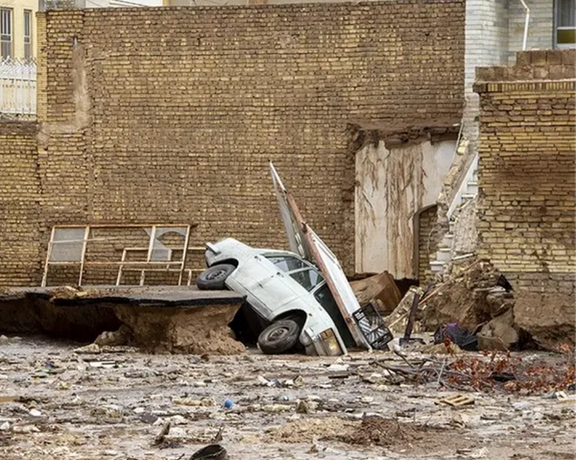
While dozens of people have been dying and going missing in ongoing flash floods across Iran, survivors confronted President Ebrahim Raisi as he was visiting affected areas.

While dozens of people have been dying and going missing in ongoing flash floods across Iran, survivors confronted President Ebrahim Raisi as he was visiting affected areas.
Videos of Raisi’s “unannounced” visit to Firouzkouh (Firuzkuh), one of the flood-hit areas north of Tehran, surfaced on social media Saturday evening showing people berating the president over empty promises and lack of dams or other needed infrastructure to protect their homes against such disasters.
People interrupted Raisi’s speech and told him that they have lost their homes and family members, criticizing him and the authorities for inaction and forgetting their hardship within a few days.
Estimated material damage so far has reacged $700 million according to official sources.
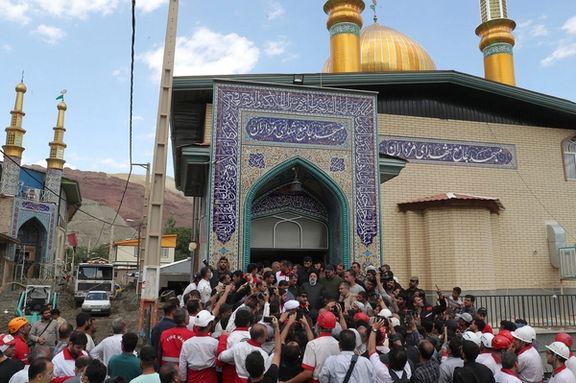
Rare summer monsoon rains and floods in Iran have wreaked havoc in many provinces, with at least 110 people dead or missing, amid the worst annual drought in recent memory.
According to official figures, as of Sunday, 70 to 80 people are confirmed killed in the floods, and at least 45 others missing. Twenty-four of Iran’s 31 provinces are affected by heavy rains and floods, with at least 20,000 homes destroyed.
Indian sub-continent summer monsoons usually bring some rain showers to Iran’s arid plateau, but every few decades the impact becomes more intense and causes flooding.
Partly due to the arid nature of the land and partly because of neglect in urban planning, even a modestly strong storm leads to deadly floods in Iran. Many dry riverbeds are choked off with construction or debris dumped by residents, leading to sudden flash floods in places no one expected.

A conservative newspaper in Iran has criticized officals for claiming they could nullify US sanctions by resistance rather than by reaching a nuclear deal.
Jomhouri Eslami (Islamic Republic), was launched in 1979 by current Supreme Leader Ali Khamenei as the mouthpiece of the fundamentalist Islamic Republic Party but has increasingly adopted a critical stance against hardliners who have established full control over the state.
The newspaper wrote on Saturday, July 30 in an editorial by its editor Massih Mohajeri, , a cleric who maintains his own independent views regardless of the paper's former political affiliation, that the Raisi administration has visible weaknesses in the area of foreign policy and nuclear negotiations."
During the past year, Jomhouri Eslami has opposed the Iranian government's official views on foreign policy issues including relations with the Taliban in Afghanistan, Russia's invasion of Ukraine, and the nuclear talks and domestic political issues including the violent crackdown on what Iranian hardliners call "bad hijab" women.
Diplomats negotiating to revive the 2015 nuclear deal, JCPOA, have repeatedly said that an agreement has almost been completed in 11 months of talks in Vienna, but Tehran demands more sanctions be lifted than Washington is willing to waive.
The daily wrote that many Iranians ask in political circles, family gatherings and government and private business office meetings "Where are we standing in the talks about [reviving] the nuclear deal and where are we headed? Will the negotiations result in an agreement or remain futile?"
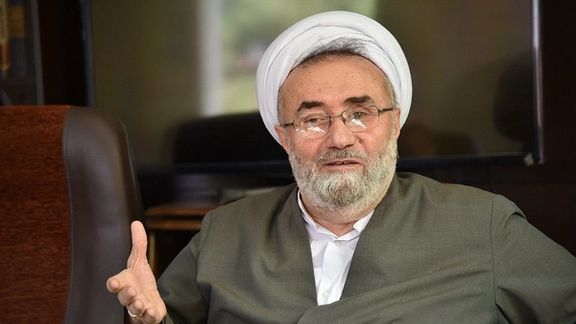
According to the daily, the question arises by the fact that contrary to slogans by Iranian officials, a major part of the economy and the people's livelihoods are tied to the sanctions. The newspaper stressed that slogans about nullifying sanctions without doing any harm to the people have led to no tangible results.
"Those who chanted that slogan have been in charge of the country's executive affairs for a year now, and they have reached the conclusion that Iran's economic problems cannot be solved without lifting the sanctions," Mohajeri wrote.However, he acknowledged that part of the country's problems are the outcome of the inefficiency of Raisi's economic ministers and Raisi has so far refused to replace them.
"The paper said there is now an opportunity to reach a fair deal. “While officials on both side agree that an agreement is within reach, and some regional players have talked about a golden opportunity to reach a deal, Iranian officials are expected to realize that no better situation is going to emerge for an agreement," stressed the Jomhouri Eslami, adding that the Iranian nation will be happy with the achievement that was within reach in May 2021 on the final days of Iran's previous government, and suggested that Iranian negotiators should strive to finalize that agreement.
During the past weeks, many Iranian observers including commentators and lawmakers criticized President Ebrahim Raisi for claiming that the people wish to resist rather than reach an agreement that would lift the sanctions and bring about a breakthrough in Iran's economy.
Some former Iranian diplomats suggested that Raisi and other ultraconservatives take advantage of the current foreign policy impasse over the revival of the JCPOA for their own personal or factional political gains to strengthen their foothold in Iran's domestic politics.
This comes while several Iranian politicians including former vice President Mostafa Hashemi Taba have said that the current foreign policy impasse perpetuates the country's paralyzing economic crisis, one of the worst in Iran's modern history.
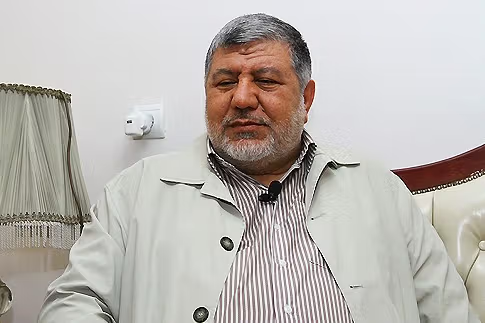
One of the bodyguards of the founder of the Islamic Republic Ruhollah Khomeini claimed on Saturday that the former Supreme Leader was assassinated by poisoning.
Hamidreza Naghashian (Naqqashian) said in an interview that Khomeini was admitted to hospital with a heart problem, but later it was found that his stomach had upper gastrointestinal bleeding.
Naghashian claimed that medications to treat Khomeini were bought through several connections from a pharmacy in London, which had not existed before and was only established for providing Khomeini’s drugs and immediately shut down afterwards.
He did not elaborate on who had prescribed the medicines and who had provided them, but said the intelligence ministry has the script of the buyers’ interrogation, adding that former president Akbar Hashemi Rafsanjani did not allow the ministry to follow up the case.
The former bodyguard also called on the authorities to increase measures to protect the current Supreme Leader Ali Khamenei because of the suspected infiltration in his office.
Since mid-2020 a series of high-profile mysterious attacks have hit Iran’s nuclear and military installations around the country, widely believed to have been Israeli sabotage operations.
In May, several IRGC officials were killed or died in suspicious circumstances, prompting Tehran to blame Israel -- which has never officially taken credit for these operations – and a major reshuffling of IRGC intelligence and counter-intelligence leadership in the following month.
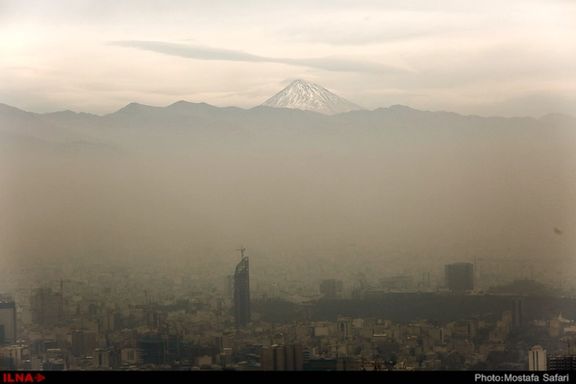
Iran was among the few countries that abstained from a vote on a resolution in the United Nations General Assembly that declared everyone on the planet has a right to a healthy environment.
In a resolution passed Thursday morning at UN headquarters in New York City, the General Assembly described climate change and environmental degradation as some of the most pressing threats to humanity’s future, calling on states to step up efforts to ensure their people have access to a “clean, healthy and sustainable environment.”
Some 161 countries voted for the resolution and only eight countries abstained, including Iran, Russia, and China.
“This resolution sends a message that nobody can take nature, clean air and water, or a stable climate away from us – at least, not without a fight,” said Inger Andersen, the executive director of the UN Environment Program (UNEP).
The move followed a similar vote by the UN Human Rights Council that declared in April that access to a “clean, healthy and sustainable environment” is a human right.
Earlier in July, sandstorms and dangerously polluted air led to the closure of schools and some government offices in Iran’s capital Tehran as well as several other cities across the country.
Tehran was logged as the most polluted city in the world in April with air quality hazardous and visibility very low largely due to the very high level of airborne particles. The capital’s pollution is mainly blamed on poor government policies, desertification and low water levels, as well as climate change that has intensified sandstorms.
Moreover, the usage of highly polluting diesel and mazut fuels in power plants jumped in Iran in 2021 on top of increases in previous years.
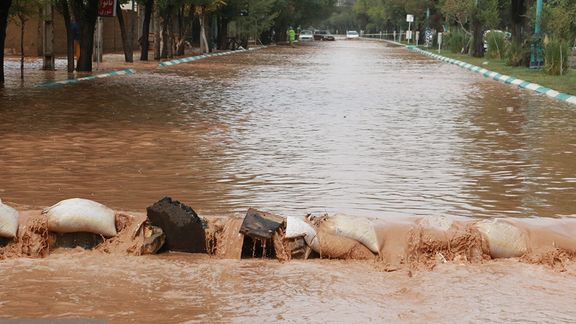
Rare summer monsoon rains and floods in Iran have wreaked havoc in many provinces, with dozens dead or missing, amid the worst annual drought in recent memory.
According to official figures, as of Friday night, early Saturday, 56 people were confirmed killed in the floods, and at least 16 others missing. Nineteen of Iran’s 31 provinces, 38 cities and 106 towns are affected by heavy rains and floods.
Indian sub-continent summer monsoons usually bring some rain showers to Iran’s arid plateau, but every few decades the impact becomes more intense and causes flooding.
This week the storms spread throughout the arid regions. The central Yazd city, with an annual precipitation of just 4 centimeters, received 5 centimeters of rain from Thursday to Friday. There are videos showing centuries-old historic buildings destroyed or severely damaged in the province of Yazd. This perhaps is an indication of the unprecedented impact of the monsoon rains.
The video below shows historic buildings collapsing in Yazd province
Partly due to the arid nature of the land and partly because of neglect in urban planning, even a modestly strong storm leads to deadly floods in Iran. Many dry riverbeds are choked off with construction or debris dumped by residents, leading to sudden flash floods in places no one expected one.
This year some forecasts had said that the Indian monsoon will have above-average intensity, but why the impact has moved so far west of India, is not clear. What some experts say is that warmer temperatures and more dust storms in the Middle East can contribute to the intensification of monsoon conditions over the Indian ocean. Western parts of Pakistan near Iran were hit hard in June and early July with dozens of people dying in floods.
The last time a very strong Indian or South Asia monsoon hit Iran was in 1956, with devastating floods.
Areas in and around Iran’s capital, Tehran experienced flash floods on Thursday and Friday with more than 20 killed and large mud slides covering densely populated urban parts of the 15-million Greater Tehran region. Authorities warn of more rains until Sunday, July 31.
Officials in the northern Caspian Sea region on Friday spoke of three “foreigners” killed in floods and 8 missing, but did not mention their nationalities. The Caspian coast, which has a subtropical climate and forested hills is a popular destination for Iranian tourists and occasionally foreigners.
Before the storms, Iran was experiencing its most arid year, with extremely high temperatures in the south, at times nearing 50 degrees Celsius or more than 120 Fahrenheit, with heavy dust pollution. Deaths were reported from the high temperatures and dust storms.
Precipitation was at least 30 percent less than last year, which itself was a drought period. Water reservoirs behind major dams were down by an average of 70 percent from their top capacity. The destructive monsoon rains will partly alleviate the water shortage, but it is not clear how much of the water will end up behind dams.
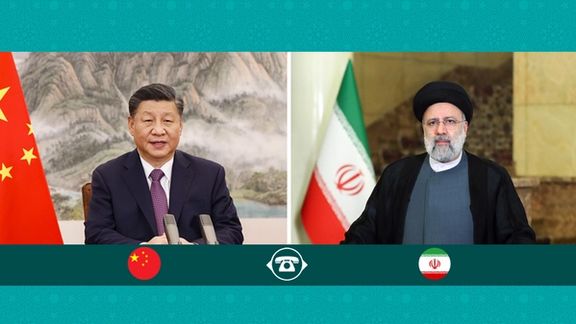
Iranian President Ebrahim Raisi and Chinese President Xi Jinping held a telephone conversation Friday in which they called for enhancing solidarity and cooperation in all spheres.
During their hour-long phone call he two presidents underscored the importance of strategic relations between Tehran and Beijing but nothing truly new was reported in the readouts of the talk. The Chinese president had a call with US President Joe Biden the day before.
According to the Iranian readout of the call, Raisi reiterated that reviving the 2015 agreement, officially known as the Joint Comprehensive Plan of Action (JCPOA) depends on a "political decision" by Washington as it was the US that left the agreement and imposed sanctions on Tehran. There was no mention of the nuclear deal in the Chinese readout of the phone conversation.
Somehow similar to Xi’s call with Biden, in which the “one China” policy was among the main topics, the issue of Taiwan also came up in his call with the Iranian president.
"Support for the One China policy is a definite and principled policy of the Islamic Republic of Iran," Raisi said, criticizing the US interference in the internal affairs of countries.
Raisi told Xi that Tehran is resolved to expand relations with Beijing in all fields regardless of international developments, especially in providing maritime security and transfer of energy.
The two also talked about the implementation of the 25-year strategic partnership agreement between Tehran and Beijing as well as regional and extra-regional arrangements such as the group of the world’s emerging economies, known as BRICS, and the Shanghai Cooperation Organization.